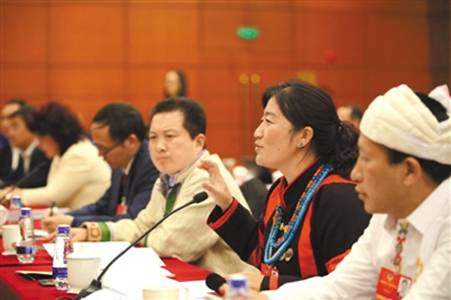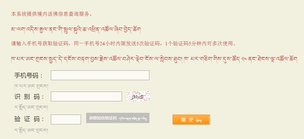Dalai’s ‘democracy’ facade over theocracy
In recent years, the Dalai Lama group has staged a number of politics farces. According to Tibet.cn, a supporter of Lobsang Sangay, "Kalon Tripa" (prime minister) of the exiled government, attacked a supporter of Penpa Tsering, a candidate in the Tibetan parliament-in-exile, during the elections.
The news has attracted global attention. The scandals exposed around the Dalai Lama clique in recent years have reflected the fractional struggles and contradictions within this group. For a long time, the group has been cheating the international community for sympathy and support by covering up its internal division with "democratic politics."
It is widely known that before the Dalai group fled to India in 1959, the upper stratum of Tibet rigidly kept its feudal serfdom under theocracy. Although they resorted to "democratization" after fleeing, this did not mean they would give up their original "characteristics."
After all, feudal serfdom under theocracy has long been abandoned by Western countries. The 14th Dalai Lama talks about political issues as a religious figure on international stage, which has triggered doubts among some Western scholars.
The group's so-called democratic politics is in name only. They use this slogan as a disguise, begging for international sympathy and approval so as to pursue the "Tibet independence" plot.
Beside, sects and regional conflicts have long existed in the Dalai clique. The pseudo-parliament is the main arena for power struggles where different sects and groups heatedly debate means of election and quota allocations.
However, surprisingly, among overseas Tibetans, each monk enjoys a time-honored privilege of two votes. The old Tibetan theocracy consists of two sets of political systems - religious and secular.
After the Dalai fled into exile in India, the pseudo-parliament was developed into a mixed institution with both monks and secular people. In this way, each monk enjoys two votes, with the additional one granted based on his sects. The pseudo-parliament replaces political parties and constituents with various sects, and allocates additional quotas to monks. This is ironic for the Dalai Lama, who claims to be a follower of Western democratic politics. The Dalai Lama's "democratic political" system has become a freak in the world democratic development.
Besides electoral disputes, the Dalai clique has seen many other long-term and tense conflicts. The Dalai Lama's suppression of heretics has revealed his intolerant religious policy.
Above all, the Dalai Lama's democratic politics farce is essentially aimed at separating China and pursuing Tibet independence. Dalai's "democratic election" is hypocritical and absurd, which is a negative example for the world to recognize democracy.
The author is Wang Xiaobin, a research fellow with the China Tibetology Research Center. opinion@globaltimes.com.cn Follow us on Twitter @GTopinion
Editor: Ellen Liu
Your Comment
Name E-mailRelated News
-
;
-
-

-
Commentary: Everyone has a responsibility to protect folk art
Folk art is culture. It is an imminent task and a responsibility for everyone and every institution to protect the folk culture.
-
-
-

-
Tibet official: fake Rinpoches undermine reputation of Tibetan Bud
Some fake Rinpoches have undermined Tibetan Buddhism's reputation for their behaviors of swaggering and deceiving people.
-
Based in Lhasa, Tibet Vista is a Tibet travel agency that specialized in Tibet permit, and Tibet tours for both private and group travelers at a local price!
•4 Days Lhasa City Group Tour from USD 460 •8 Days Everest Base Camp Group Tour from USD 850 •15 Days Mt.Kailash Group Tour from USD 1780 •2016 Tibet Train Tours from Beijing, Shanghai, Chengdu, Xining,etc










